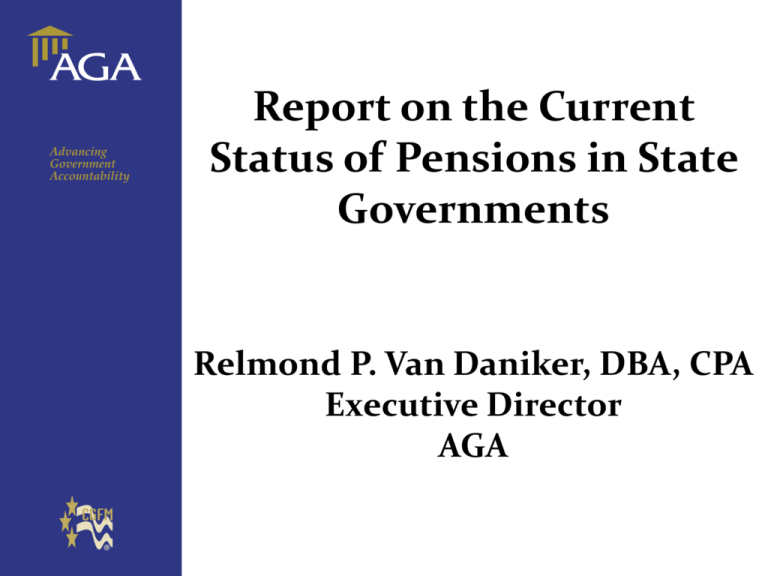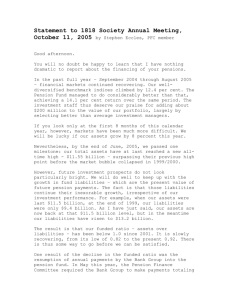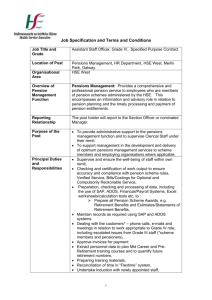State Pensions - Relmond Van Daniker
advertisement

Report on the Current Status of Pensions in State Governments Relmond P. Van Daniker, DBA, CPA Executive Director AGA About the Public Fund Survey • Online compendium of public retirement system data accessible at www.publicfundsurvey.org • Contains data on 101 systems and 126 plans that together account for ~ 85 percent of all public retirement system assets and participants in the U.S. • Data set includes FY 01 through FY 09 • Sponsored by NASRA and NCTR • Data is inputted into a database as it becomes available; database is uploaded and feeds the website • Most data comes from system CAFRs • A key objective of the survey is to promote sound public retirement system policies and administration by increasing transparency and understanding of the public retirement system community. Figure A: Change in aggregate actuarial value of assets, liabilities, and funding levels, FY 01 to FY 09 Summary of Findings Figure B: Change in aggregate public pension funding level, 1990 to 2009 101.3 Aggregate Funding Level 97.1 91.3 87.9 86.3 85.3 86.1 85.0 79.8 Trillion $3 101.3 AVA AVL 96.0 97.1 91.3 $2 89.0 85.0 86.0 87.9 86.3 86.1 85.3 85.0 82.0 $1 79.8 79.0 90 01 02 03 04 05 06 07 08 09 92 94 96 98 00010203040506070809 Fiscal Year Summary of Findings Figure D: Distribution of actuarial funding levels for plans in the Public Fund Survey, based on latest available data 120% 100% 80% 60% 41.3% Size of bubbles is roughly proportionate to size of plan liabilities Summary of Findings Figure E: Comparison of corporate and public pension funding levels, FY 00 to FY 09 Figure F: Comparison of change from prior year in corporate and public pension contributions, 1989-2009 Funding Level 80% * 120% 60% 110% Corporate 40% Corporate 100% 20% Public Public 0% 90% -20% 80% 00 01 02 Wilshire, Milliman, and Public Fund Survey 03 04 05 06 07 08 09 89 90 91 92 93 94 95 96 97 98 99 00 01 02 03 04 05 06 07 08 09 US Dept of Labor, *Estimate US Census Bureau, Milliman Summary of Findings Figure G: Median change from prior year in actuarial value of assets and liabilities 8% Median Change in Liabilities 6% 4% Median Change in Actuarial Assets 2% 0% 02 03 04 05 06 Fiscal Year 07 08 09 Summary of Findings Figure J: Average asset allocation, FY 02 to FY 09, with FY 09 averages listed Cash/Other 4.4% Real Estate 5.9% 100 90 80 Fixed Income 29.0% 70 60 Alts 8.7% % 50 40 30 Equities 52.1% 20 10 0 02 03 04 05 06 07 Fiscal Year 08 09 Summary of Findings Figure N: Median employee and employer contribution rates as a percentage of pay, Social Security-eligible workers, FY 02 to FY 09 12.7% Employers 11.2% non/Social Security 10.7% 10.7% 10.3% 10.3% 10.3% Employees non Social Security 8.0% 11.8% Employers w/ Social Security 9.4% 8.7% 8.5% 8.5% 8.0% 7.1% 6.5% 6.0% Reflects general employees and teachers only; does not include public safety personnel 02 Employees w/Social Security 5.0% 03 04 05 06 Fiscal Year 07 08 09 Summary of Findings Figure O: Average annual required contribution paid and percentage of plans receiving at least 90 percent of their ARC, FY 01 to 09 104% 98% Average ARC Paid 89% 90% 90% 89% 85% 84% 87% 87% Percentage of plans receiving 90%+ of their ARC 69% 65% 64% 61% 61% 61% 01 02 03 88% 04 05 06 Fiscal Year 07 61% 08 09 Summary of Findings Figure Q: Distribution of inflation assumptions, FY 09 Figure Q: Distribution of investment return assumptions, FY 09 58 37 33 14 11 10 16 10 3 3 1 1 1 1 1 0 5 0 0 5 0 5 0 0 5 0 0 0 2.5 2.7 3.0 3.2 3.2 3.5 3.7 4.0 4.1 4.2 4.5 5.0 5.5 1 7.00 18 15 3 7.25 13 2 7.50 7.75 7.80 8.00 8.25 8.50 Median public fund returns for periods ended 12/31/09 19.9% 9.3% 8.1% 3.4% 3.9% -1.1% 1 3 5 10 Years ended 12/31/09 Callan Associates 20 25 Investment return assumptions are being widely challenged, and some are being changed • Large funds that have reduced their assumed investment return in recent months: – – – – – – – – – – – Colorado PERA, 8.5 percent to 8.0 percent Pennsylvania PSRS, 8.5 to 8.0 Pennsylvania SERS, 8.5 to 8.0 Illinois SERS and SURS, 8.5 to 7.75 San Diego County, 8.25 to 8.0 San Francisco City & County, 8.0 to 7.75 NY Common, 8.0 to 7.5 Virginia RS, 7.5 to 7.0 District of Columbia Retirement Board, 7.5 to 7.0 Indiana TRF, 7.5 to 7.0 Indiana PERF, 7.25 to 7.0 • The CalSTRS board will consider a recommendation this week to reduce theirs from 8.0 to 7.5 The breadth of changes made this year to pension benefits was unprecedented • At least one dozen states approved retirement benefit structures with higher years of service, age, or both, needed to qualify for normal retirement benefits – Most affected new hires only • Nine states reduced COLA provisions – Three—CO, MN, SD—affected existing retired members • Ten states raised employee contribution rates, affecting existing employees in most cases • Other popular changes: – Longer final average salary periods, more restrictive return-to-work policies, anti-spiking provisions • See http://www.nasra.org/resources/changes.htm Lawsuits filed against changes affecting existing participants • Lawsuits have been filed in – Colorado, Minnesota, and South Dakota challenging the authority of those states to reduce automatic COLAs for existing retired members • A lawsuit also has been filed in Rhode Island, challenging reductions in pension benefits for existing plan participants • A lawsuit has been filed in Michigan challenging the state’s authority to charge active participants three percent for retiree health care benefits, with no assurance of receipt of the benefit Other notable changes • New hires in Utah will have a choice of a hybrid or defined contribution plan – The state has capped its liability at 10 percent of pay • Illinois (SERS, TRS, and MRF) and Missouri (SERS) raised normal retirement age for new hires to 67 • Higher vesting periods in Iowa and Mississippi Hybrid (combo) and cash balance plans • More states now offer hybrid or cash balance pension plans – – • • Recent additions: Georgia ERS, Utah RS, Michigan teachers Other hybrids: Indiana, Texas municipal and county plans, Nebraska state and counties, Ohio (optional), Oregon, Washington (optional) Latest DC plan enactment: Utah (optional) See www.nasra.org/resources/hybriddc.pdf Furloughs, layoffs, slow membership growth • One-third of the federal stimulus package (~$260 billion) targeted state and local government employees – Most of these funds are scheduled to run out later this year • According to the National Conference of State Legislatures, some state employees have been laid off in 23 states and furloughed in 25 states • A survey conducted last summer found that cities and counties could lay off nearly half a million employees in 2011 if more federal help was not provided • Bloomberg reports that states and cities have reduced payrolls since August 2008 by some 400,000 workers Notable studies and reports • An increase in the last 18 months of studies calculating unfunded pension liabilities on the basis of a so-called riskfree return or using some another corporate-style method – Timing of these studies may be intended to influence GASB • Some studies project insolvency dates of state and local pension plans – Projected insolvency dates begin in 2015 and continue through 2047 – Five states would not run out of money – Conclusions are derived chiefly by understating projected contributions and measuring future obligations using current (low) interest rates Public employee compensation has become the focus of growing attention • • Multiple, competing studies of pay and benefits Often fail to distinguish between federal and state & local government workers Often fail to acknowledge key facts: • – – – Public employees are twice as likely to have a college degree than the private sector workforce Many public employees work in positions involving physical risk – police, fire, corrections The public sector workforce stays on the job longer Overwhelming number of policy recommendations emerging with regard to State/local fiscal restructuring; public pensions a major target – Calls for Linking State Pension Reform to Federal Aid – Dodd-Frank Requirements on Municipal Advisors, GASB Funding, New SEC Office of Municipal Securities – House Resolution (H. Res 23) citing state and local budget issues, pension costs and opposing public pension bailout – Legislation (HR 6484) to impose new federal reporting on public pension costs, threat of removing federal tax exemption for state and local bonds – Discussions regarding Congressional action to permit States to declare bankruptcy Calls for linking Federal aid to state pension reform "The Federal government bailed out Illinois and other states with stimulus money. They can't tell Congress it has no business demanding reform of these unsustainable pension plans.” – Congressman Mike Quigley (D-IL) “[E]ligibility for [any further round of Federal assistance to the states] should be conditioned on the states and municipalities putting in place plans to address their long-term structural pension deficits…” – New America Foundation “And [$50 billion in new Federal aid to States, localities to avoid layoffs of teachers, public safety employees] can be designed with appropriate safeguards to ensure that they achieve their objective of keeping people working, rather than rewarding states for poor past policy choices.” – President Barack Obama Federal interest in municipal finance and public pensions – New enforcement division unit created on Municipal Finance and Public Pensions – New Office of Municipal Securities established within the SEC – MSRB reconstituted, so that a majority of members are independent of the municipal securities industry, expanded mission with regard to protecting state and local governments and public pensions – GASB Funding (FINRA fee; GAO study – including feasibility of “Tower amendment repeal”) SEC proposed regulations on municipal advisors • Employees of a municipal entity are excluded from the definition of “municipal advisor” (subject to registration with SEC and MSRB) • However, in the recent proposal, SEC takes the position that appointed members of a governing body of a municipal entity who are not elected ex officio members should be included in the definition of a "municipal advisor." Federal “Sustainability” Proposals • FERS/CSRS Modifications – COLAs, FAS, EE Contributions • Social Security Computation Changes – COLAs, AIME (#Years and Type of Index), Taxable Earnings, NRA, Spousal Benefits, Death Benefits, Children’s Benefits Alarmist reports fueling Congressional interest • Many reports are unduly alarmist and use unrealistic assumptions regarding investments, contributions and ability to address issues at the State and local level • Many suggested “solutions” only exacerbate the situation: – Mandatory Social Security – Closing the DB plan to new-hires and switching to 401(k)-type plan – Pension obligation bonds – Federal aid contingent on pension reforms Facts do not support the hyperbole • Public pension remain well-positioned to pay benefits to retirees for the foreseeable future • The recent market shift may require modifications to be made at the State and local levels in order to secure financing for the very long-term, but it is not an immediate crisis • Governments/Employees have the time to rebuild reserves with a patient and proactive approach that retains the key elements – However, each will require diversified approaches to rebuilding reserves and have a long time horizon that allows for a patient and metered response • Federal government has its own fiscal problems Employer (taxpayer) spending on public pensions as a percentage of total state and local government spending, 2009 2.9% 97.1% Spending on Public Pensions All Other State and Local Government Spending Proper perspective needed • In reality, less than three percent of all state and local government spending goes toward public pensions. • Nearly 90 percent of public employees are required to contribute a portion of their wages—typically five to eight percent—to their state or local pension fund, and some share pension costs equally with their employers. • An estimated 30 percent of employees of state and local government do not participate in Social Security, including approximately one-half of all of the nation’s public school teachers, and more than three-fourths of firefighters and police officers. • In most of these cases, employers and employees are contributing to the pension fund in lieu of contributions to Social Security, reducing state and local taxpayer costs by an estimated $15 billion annually. Annualized changes in employment State, Local and Private January 2005 = 100% Local 104% State 102% 100% Private 98% 96% Jan-05 U.S. Bureau of Labor Statistics Sep-07 Jun-10 Inflation for 12-month periods ended June, 1986 - 2010 4% 25-yr avg = 2.87% 2% 0% -2% 86 CPI-U, U.S. Bureau of Labor Statistics 96 06 10 Annualized change in employee compensation Private Sector and State & Local Government 1Q 01 to 2Q 10 4% State & Local Government 3% Private Sector 2% 1% 1Q01 1Q02 1Q03 1Q04 U.S. Bureau of Labor Statistics 1Q05 1Q06 1Q07 1Q08 1Q09 1Q10 State and local fiscal fortunes are tied to the national economy • “The bulk of the recent deterioration in state and local government finances is attributable to macroeconomic cyclical forces.” • “If the economic recovery in the US were to stall, budget woes at all levels of government would intensify.” • “[I]f the national economy continues to recover as we anticipate, the near-term fiscal condition of the vast majority of state and local governments should begin to improve.” • David Greenlaw MorganStanley June 29, 2010 Daily close of Russell 3000, 6/1/95 to 7/31/10 3500 3000 2500 2000 1/1/00 7/31/10 Employee and Employer Contributions 1982 to 2008 Billions $80 Employer Contributions Employee Contributions $70 $60 $50 $40 $30 $20 $10 $0 82 83 84 85 86 87 88 89 90 91 92 93 9495 96 97 98 99 00 01 02 03 04 05 06 07 08 US Census Bureau Forecast • • • • • • • Funding levels will continue to decline Higher contribution rates for employers and for many employees Continued focus on public employee compensation and benefits Increased consideration of hybrids and DB-DC combos, cash balance plans, that shift more risk to participants Efforts to reduce future benefit accrual rates Pressure to reduce investment return assumptions Pressure to switch to DC plans Key Takaways • With no changes to benefit levels or financing arrangements, most public pension plans have assets sufficient to continue to pay benefits for decades • Benefit levels and financing structures have been assessed for virtually all plans in the wake of the market decline • Due to asset smoothing methods and actuarial valuation dates, the effects of the 2008-09 market decline are being phased in • Long funding horizons and other practices provide time to consider options and make modifications 36 Key Takeaways • An unprecedented number of plans made changes in 2009 and 2010, chiefly in response to the effects of the 2008 market decline • Changes are likely to continue to be made in 2011 and beyond • The unique nature of each plan and pension plan sponsors requires a unique response • Modifying plan designs and financing arrangements is not new • Improving capital markets are helping to offset the effects of the market decline: S&P 500 is higher today by 75 percent from March 2009 37 Key Takeaways • A plan’s actuarial funding level is a snapshot of a financial condition that exists over decades • For plans with a FY-end date of June 30, the market value of assets was measured near the market low point • The critical factor in assessing a pension plan’s condition is not its funding level, but rather whether or not funding liabilities causes fiscal stress for the plan sponsor • For most plans, long-term investment returns, over 20-25 years, meet and exceed expectations • Core elements of a DB plan: – Mandatory participation – Pooled assets invested by professionals – Benefits paid out incrementally – easier to finance, pooled mortality risk 38 Key Takeaways – increase in market value of assets – after losing more than $800 billion in 2008, public pension funds gained $360 billion in 2009 and are on track to gain $250-$300 billion in 2010 – these gains are occurring while the funds are distributing ~$175 billion annually in benefits – benefits act as extremely important economic stabilizers - distributed to every town of every state and provide an important source of economic stimulus 39 Key Takeaways – the long-term nature of plans, operating over decades – the flexibility of DB plans to modify benefit levels and financing arrangements in response to changing circumstances – efficiencies of DB plans through pooling of assets and sharing risks – actuarial, not market funding measures – shared responsibility of costs through employee contributions – role of DB plans in promoting orderly turnover of workers – extreme costs associated with closing plans to new hires – not only lose above listed efficiencies, but it causes significant cost increases in the closed plan. 40 What is AGA Doing? • Financial Management Standards Board (FMSB) has commented on the following GASB pronouncements: - Pension Accounting and Financial Reporting by Employers (09.21.2010) - Pension Accounting and Financial Reporting (07.31.2009) - Pension Disclosures (2.28.2007) - Recognition of Pension and Other Postemployment Benefit (OPEB) Expenditures/Expense and Liabilities (11.11.2004) • Eric Berman, MSA, CPA, Chair of the FMSB, testified at GASB on October 14, 2010 in San Francisco, CA on “Pension Accounting and Financial Reporting by Employers” Citizen-Centric Reporting Advancing Government Accountability and Transparency Relmond P. Van Daniker, DBA, CPA Executive Director AGA Public Attitudes Toward Government Accountability and Transparency 2010 • Follow-up to 2008 poll on attitudes and opinions towards government financial management and accountability to tax payers. • Survey was conducted online within the United States by Harris Interactive on behalf of the AGA between November 30 and December 7, 2009 among 1,024 adults aged 18 or over. Propensity score weighting was used to adjust for respondents’ propensity to be online. • “We commissioned the survey for a second time to shed some light on the way the public perceives those issues relating to government financial accountability and transparency that are important to our members. Nobody is pretending that the figures are a shock, but we are encouraged to have seen some improvements since 2008.” - Relmond Van Daniker, DBA, CPA Executive Director, AGA 2009 Survey Conclusions • 75% of Americans believe that the availability of government financial management information is very important • The public is least satisfied with the financial management information they’re receiving from the federal government • After hearing a description of Recovery.gov, 76% indicated they would be likely to either visit or return to the site • Approximately 80-90% voted in the 2008 federal, state and local elections. Roughly 75% of these people say that financial management information was an important factor in their decisions • Overspending and/or wasting money is a top concern about government financial management across all levels • Reflecting the past two years, the public generally considers state and local government financial reporting to have stayed the same, and federal to have gotten worse Solid Findings, AGA Moves Forward • “The survey results include some extremely stark, unambiguous findings. Public levels of dissatisfaction and distrust of government spending practices came through loud and clear, across every geography, demographic group and political ideology. Worthy of special note, perhaps, is a 67 percentage point gap between what taxpayers expect from government and what they receive.” - Jennifer Haskins, Harris Interactive • “AGA members working in government at all levels are in the very forefront of the fight to increase levels of government accountability and transparency. We believe that the traditional methods of communicating government financial information – through reams of audited financial statements that have little relevance to the taxpayer – must be supplemented by government financial reporting that expresses complex financial details in an understandable form. Our members are committed to taking these concepts forward.” - Relmond Van Daniker, DBA, CPA Executive Director, AGA Improving Communication Between Government and Taxpayers AGA is committed to increasing the levels of transparency and accountability and driving understanding among the general public. Citizens have a right to an understanding of how governments are spending their money and if it is being efficient and effective. Not many governments are communicating this information to their citizens and if they do, the information is too technical for the average citizen. Citizen Communications Effort AGA believes that governments should communicate information to their taxpayers in a way that is: • Clear and understandable • Updated regularly and often • Delivered to all and easy to locate • Honest in breadth and technically accurate in detail AGA’s four-page Citizen-Centric Reporting model provides practical assistance to help governments achieve this. CURRENT STATE OF GOVERNMENT REPORTING The Problem Citizens Believe AGA Survey (2010) • Entitled to • Dissatisfied citizens transparent financial • Reporting too information technical • Distrust in government • Governments have an obligation to provide this information CURRENT STATE OF GOVERNMENT REPORTING The Answer • Citizen Centric Reporting • General Guidelines • Short (four pages) • Understandable • Easy to read • Informative Easy to Construct A Report The Important thing is to start! Obtain citizen input Review the AGA website for completed reports Collect data from the government’s website and published reports Sift through your data Organize your data Assemble your Document Best Practices in Developing a Report Cut and paste effort from government’s website and published reports Use AGA’s Content and Design Guideline Templates Assign each page to a different individual and/or team Look at completed reports for ideas Remember that the readers are average citizens – come at it from their perspective Constructing a Report – Page 1 What is the Government Chartered to do? • Vision Statement • Strategic Goals • How the government is organized • Demographics • Table to Contents Constructing a Report – Page 2 Performance Information on Key Missions and Service • Obtain input from citizens on what measures they would like to see included • Report on non-financial outcomes for 3 or 4 key missions or services (public safety, public health, roads, parks and recreation, schools) Constructing a Report – Page 2 Performance Information on Key Missions and Service (cont’d) Constructing a Report – Page 3 Revenues and Expenditures • Include revenue and cost data for major areas • Use pie charts • Reference audit conducted • Reference website for detailed financial information Constructing a Report – Page 4 Future Challenges and Economic Outlook • Include items specific to the community that will have future effects (economic changes, tax cuts or increases, major new employer, employer leaving, unemployment, technological improvements, infrastructure improvements, education, environmental aspects, being transparent, etc) • Ask for feedback by including a contact name and contact information Constructing a Report – Page 4 Future Challenges and Economic Outlook (cont’d) Constructing A Report Design Guidelines • Visual Appeal & Readability • Use of Pictures and Graphics, Color • Ample White Space (not text heavy • Free of technical jargon • Professional designer or publishing software Distribute the Report/Feedback • Print in local newspaper • Ask for feedback • Post to website • Web statistics • Print bulk copies – • Calls to office libraries, grocery stores, city hall • Hold a press conference • Governor’s office and government officials • Activist groups • Mentions in the media General paragraph Nevada 2page ARRA CCR General paragraph Nevada 2page ARRA CCR Completed Reports AGA The District of Columbia Local Governments: The Village of Los Lunas, NM City of Bellevue, WA Beavercreek Township Fire Dept, OH City of Columbus, IN Benton County Treasurer, WA City and County of Denver Blount County, TN City of Jefferson, MO Guilford County, NC City of Lancaster, MA King County, WA City of Las Vegas, NM Maricopa County, AZ City of Palo Alto, CA Metro Govt of Nashville/Davidson County, TN City of Portland, OR City of Portsmouth, VA City of Saco, ME City of Stamford, CT City of Tallahassee, FL Palm Beach County Tax Collector, FL Springfield-Greene County Health Dept, MO St Louis County, MN Completed Reports (Cont’d) State Governments: Federal Government: Idaho State Police US Coast Guard State of Idaho Denali Commission State of Maryland General Services Administration MA Developmental Disabilities Council National Science Foundation State of Nevada The Architect of the Capitol State of New York Treasury Franchise Fund State of Oregon USAID State of South Carolina US Department of Defense TN Comptroller of the Treasury US Department of the Interior State of Texas Other: State of Washington FMI Canada State of Washington Audit The University of Guam Guam Public School System Incentives Certificate of Excellence in Citizen-Centric Reporting (and Achievement Certificate) Peer Reviewed Chapter Recognition Bonus Credits Make contact with a government, encourage them to produce and publish a four-page Citizen Centric Report—100 credits per contact made Government that you contacted produces and publishes a four-page Citizen Centric Report—500 credits per published report AGA Citizen-Centric Reporting Model AGA believes that these reports will make governments more accountable to their citizens, and will help Americans become better educated and better able to participate in government activities. Citizen-centric reporting is an important practical step that governments can take in raising their game in accountability and transparency. The program is an essential component of AGA’s Advancing Government Accountability Mission. SUMMARY • The Problem • The benefits – Dissatisfied citizens – Reliable source of information – Distrust – Improved relationship between • The solution – Citizen Centric Reporting Model – Increased transparency citizen and government – Increased accountability – Increased civic involvement by citizens – Informed Citizenry Tools and Guidance Online Content Guidelines Design Guidelines Completed Reports www.agacgfm.org/citizen Susan Fritzlen – sfritzlen@agacgfm.org 1.800.242.7211






